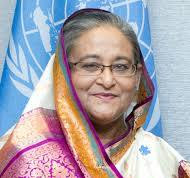**"Sheikh Hasina's Journey: From Exile to Power in Bangladesh's Turbulent Democracy"**
Sheikh Hasina, the current Prime Minister of Bangladesh, has had a tumultuous political career, marked by periods of exile, political struggle, and governance challenges. Her life and career have been significantly influenced by Bangladesh's political instability and the role of the military in the country's governance.
### Background and Exile
Sheikh Hasina is the daughter of Sheikh Mujibur Rahman, the founding father and first President of Bangladesh. In August 1975, Sheikh Mujibur Rahman and most of his family members were assassinated in a military coup. At the time, Sheikh Hasina and her sister Sheikh Rehana were abroad. Following the coup, Bangladesh experienced a period of military rule, and Hasina lived in exile in India and the UK for about six years.
During her exile, Sheikh Hasina became a key figure in the Awami League, the party founded by her father. She returned to Bangladesh in 1981 to lead the party and entered politics full-time. Despite facing threats and political challenges, she continued to lead the Awami League and became a prominent opposition figure.
### Political Landscape and Military Role
Bangladesh's political landscape has often been marred by instability, corruption, and the involvement of the military in politics. The country has experienced several coups and periods of military rule since its independence in 1971. The military has traditionally played a significant role in the country's governance, often stepping in during times of political crisis.
Sheikh Hasina has been a key player in Bangladesh's transition to democracy. She served as Prime Minister from 1996 to 2001 and then again from 2009 onwards. Her tenure has seen both significant economic growth and allegations of authoritarianism. The political environment has been highly polarized, especially between the Awami League and the Bangladesh Nationalist Party (BNP), led by Khaleda Zia.
### Current Situation and Future of Democracy
The ruling by the High Court over a quota system for government job awards served as the first impetus for the uprising. In 1972, following Bangladesh's independence from Pakistan, a system was established that granted thirty percent of government posts to the offspring of "freedom fighters," or those who fought for liberation. Because her father, Sheikh Mujibur Rahman, was the nation's founding father, Prime Minister Hasina has a personal connection to the quota system.
That system was in effect until 2018, when the courts decided to do away with it as a result of widespread objections. However, the High Court overturned that ruling on June 5 of this year, paving the way for the system to be put back in place. Critics and opposition parties have maintained that these quotas unfairly advantage the descendants.
Such quotas, according to opposition parties and other opponents, unfairly benefit the offspring of pro-government supporters and are intended to promote bureaucratic loyalty and uphold the authority of the ruling Awami League. The general impression that there are few chances for merit-based positions in the public sector and the notion that some Bangladeshis manipulate the system by obtaining phony credentials as independence fighters are the main sources of unhappiness.
The Supreme Court of Bangladesh ordered on July 21 that just five percent of government positions should go to the descendants of independence fighters, possibly as a means of containing the mounting unrest. Still, the demonstrators were not won over. The student organization organizing the protests,
The student organization leading the protests, Students Against Discrimination, declared on July 22 that it would suspend its demonstrations for 48 hours, which it then extended for a further 48 hours in order to give the government time to fulfill a fresh round of requests. Hasina personally apologized for the protestors' murders; law enforcement officers, government officials, and university officials involved in the crackdown were arrested or resigned; and victims' and their families' recompense was among them.
The current state of democracy in Bangladesh is complex. While the country has held regular elections, there have been concerns about the fairness and transparency of these elections. The political climate has been characterized by the suppression of opposition voices, restrictions on the media, and a shrinking space for civil society.
The military continues to play a behind-the-scenes role in Bangladesh's politics, though it has generally refrained from direct governance in recent years. The future of democracy in Bangladesh will depend on several factors, including the conduct of future elections, the role of the judiciary and media, and the ability of political parties to engage in peaceful and constructive dialogue.
The continued involvement of the military in politics, the concentration of power, and concerns about human rights and political freedoms pose significant challenges to the development of a more robust democratic system in Bangladesh. However, the country's economic progress and the resilience of its civil society provide some grounds for cautious optimism.
Keywords-Sheikh
Hasina, Prime Minister of Bangladesh, Sheikh Mujibur Rahman, Bangladesh
economic growth, Padma Bridge, Dhaka Metro, Bangladesh infrastructure, climate
change Bangladesh, political stability Bangladesh, future of Bangladesh.

No comments:
Post a Comment